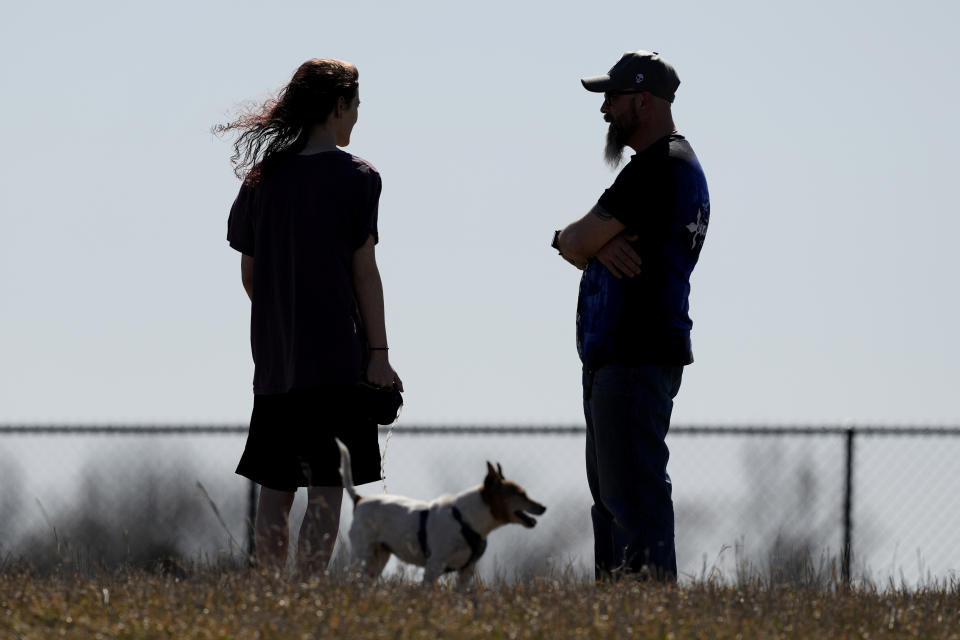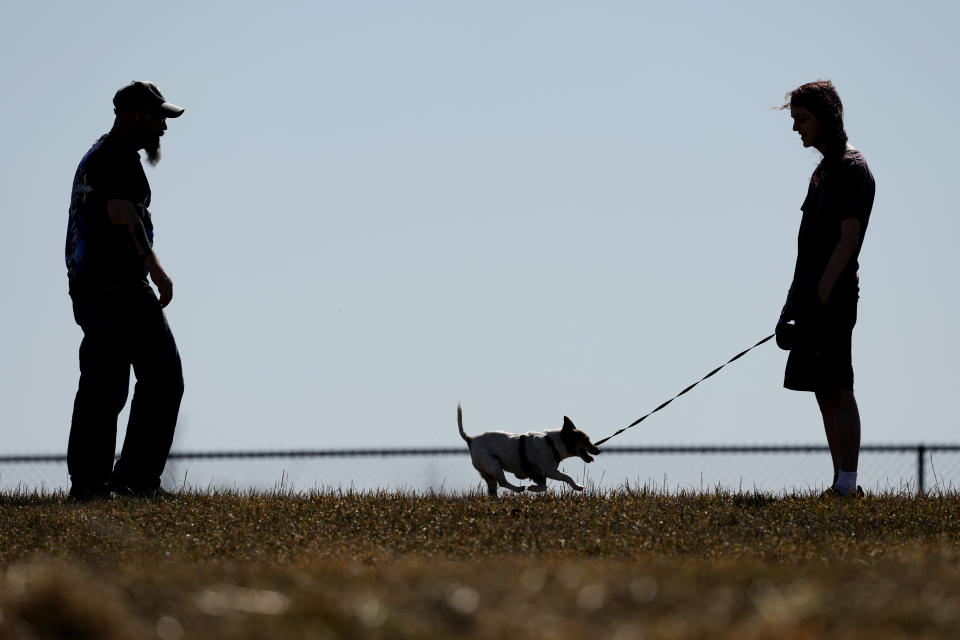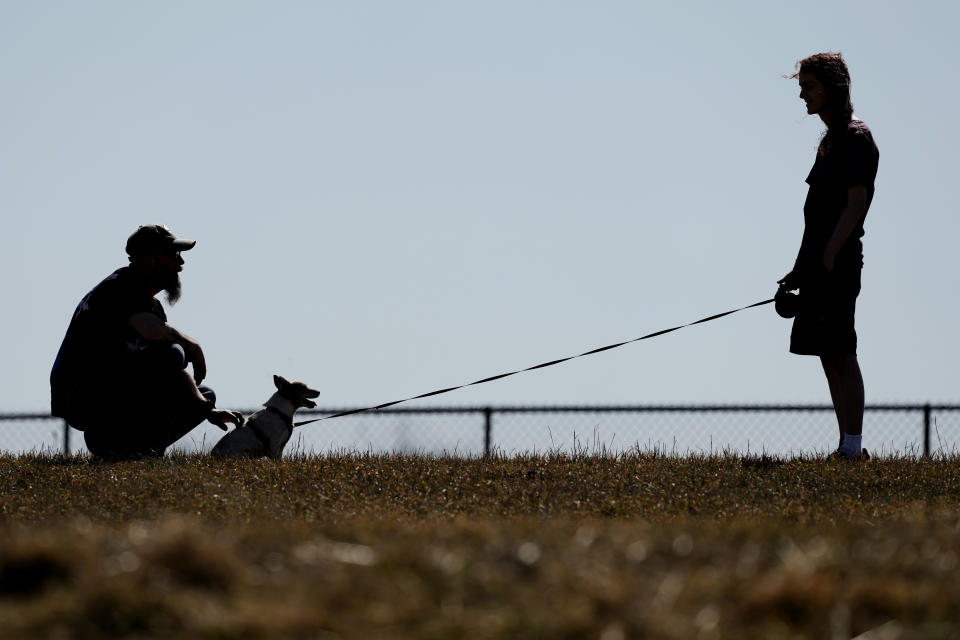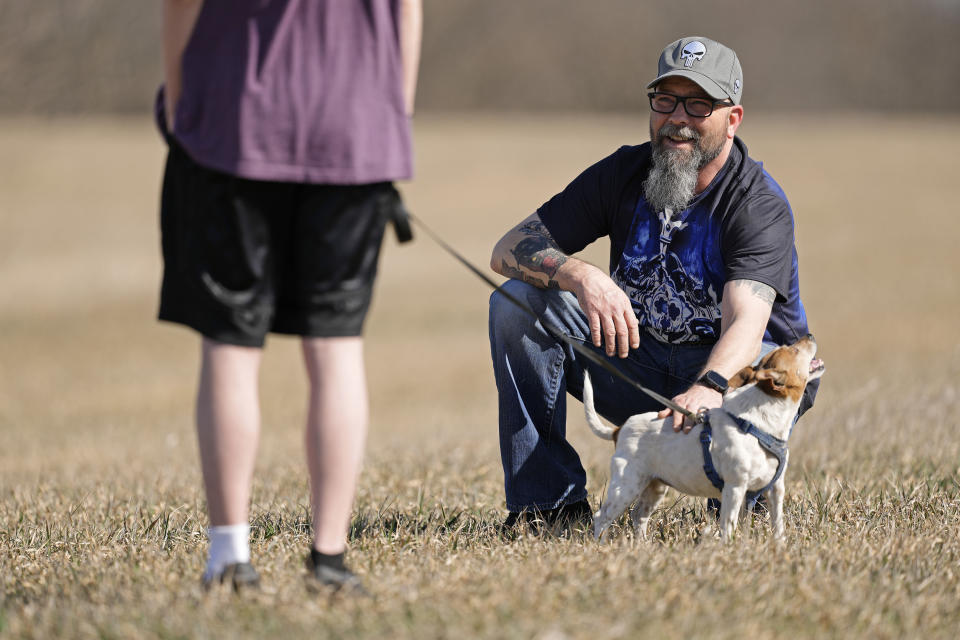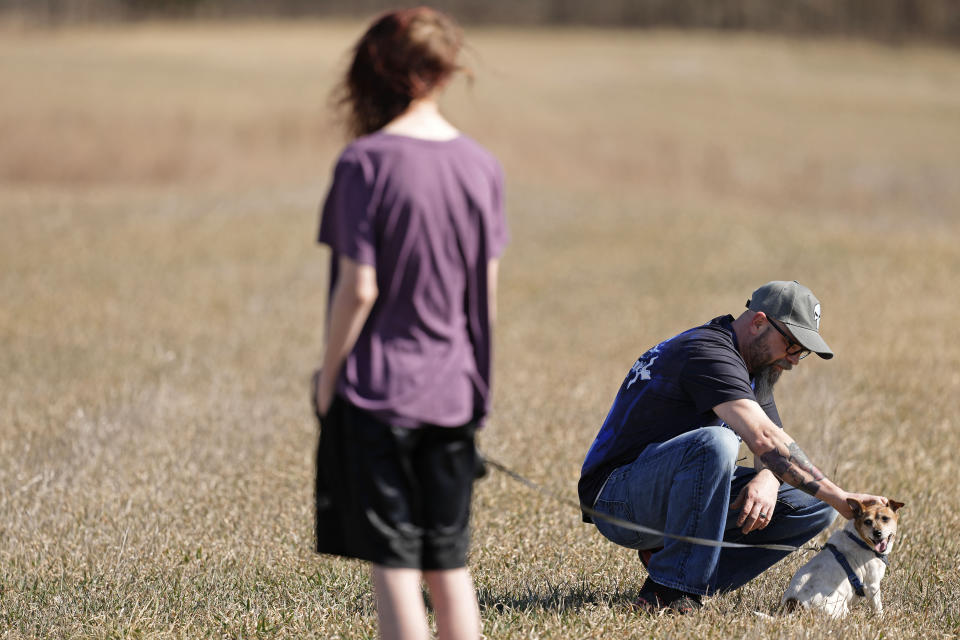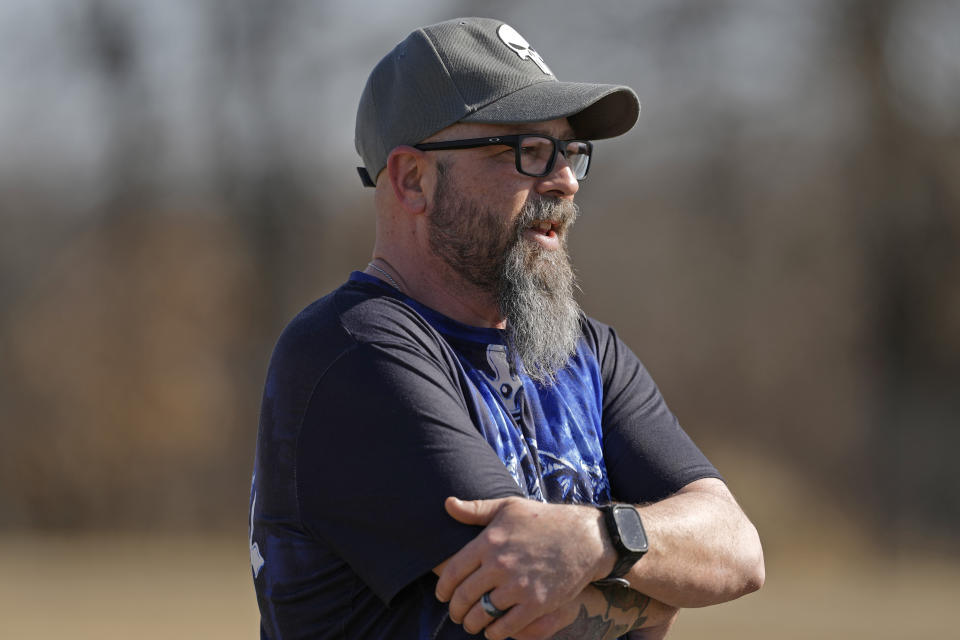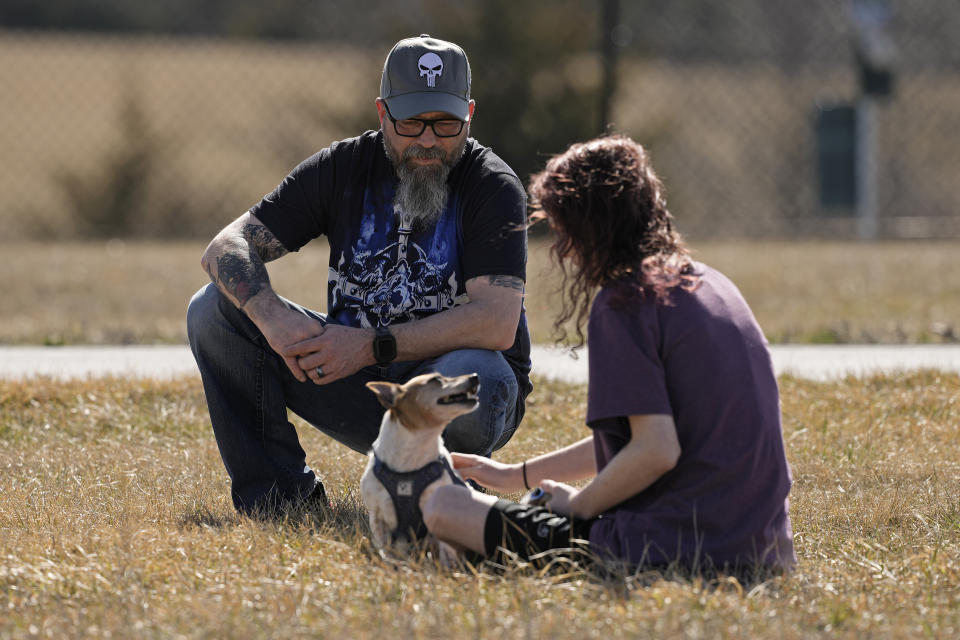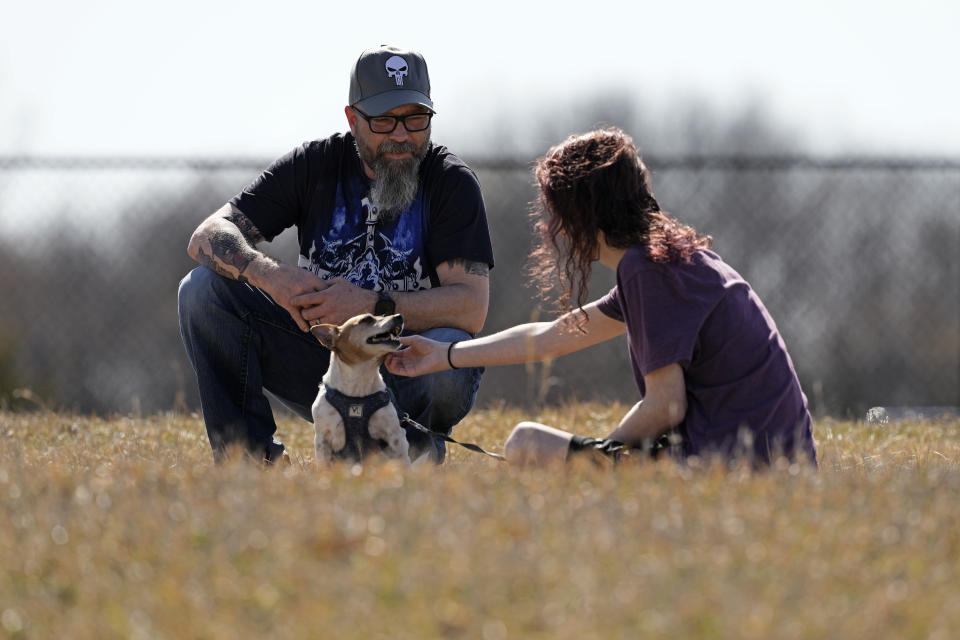As his trans daughter struggles, a father pushes past his prejudice. 'It was like a wake-up'
SMITHVILLE, Mo. (AP) — Before his transgender daughter was suspended after using the girls’ bathroom at her Missouri high school. Before the bullying and the suicide attempts. Before she dropped out. Before all that, Dusty Farr was — in his own words — “a full-on bigot.” By which he meant that he was eager to steer clear of anyone LGBTQ+.
Now, though, after everything, he says he wouldn’t much care if his 16-year-old daughter — and he proudly calls her that — told him she was an alien. Because she is alive.
“When it was my child, it just flipped a switch. And it was like a wake-up," says Farr, who is suing the Platte County School District on Kansas City’s outskirts.
Looking back, Farr figures his daughter, the youngest of five, started feeling out of place in her own body when she was just 6 or 7. But he didn’t see it, even as they fished and camped together.
Then when she was 12, she started to steer away from him, spending more time with the rest of the family. It lasted for a few months before she came out. He knows now how hard this was. “Growing up,” he says, “my kids knew how I felt.”
His wife, whom he described as less sheltered, was on board immediately. Him, not so much.
“Given the way I was raised, a conservative fire and brimstone Baptist, LGBTQ is a sin, you’re going to hell. And these were things, unfortunately, that I said to my daughter,” Farr says. “I’m kind of ashamed to say that.”
They bumped heads, their relationship strained. In desperation, he turned to God and then it hit him: “She’s a girl.”
His daughter, who is named only by her initials of R.F. in the lawsuit, was stunned. He had been, she recalls, “to say it nicely, very annoying.” Now everything was different.
“There was this electricity in me that was just, it felt like pure joy,” she recalled as she played with her dog at a park in February. Her father was with her.
She, her father and her attorneys asked that she remain anonymous because she is unnamed in the lawsuit and to protect her from discrimination.
She was diagnosed with gender dysphoria, or distress caused when gender identity doesn’t match a person’s assigned sex. She grew out her hair and began taking drugs to delay puberty — a common treatment.
Farr says things returned to normal — for the most part. But then came high school. “And,” Farr says, “anything I did to her, school was 10 times worse.”
The 2021-22 school year had just started when the assistant principal pulled his daughter aside. According to the suit filed last year, the administrator said students must use the restroom of their sex designated at birth or a single gender-neutral bathroom. The district disputes that happened .
Another employee, the suit said, took it further and told her using the girls’ bathroom was against the law. The district disputed that happened, too.
The thing is, there isn’t a law — at least, not in Missouri.
While more than 10 states have enacted laws over bathroom use, Missouri is not one of them. What Missouri has done is impose a ban on gender-affirming care. For bathrooms, it leaves policy debate to local districts.
“Asinine” is how Farr described the whole wave of restrictions, while acknowledging in the same breath that he probably would have supported them a decade ago. “Kind of makes me dislike myself a little bit.”
He figured it was all just a way to intimidate her. His daughter didn’t understand: “It kind of just made me feel hopeless in my education,” she recalls thinking.
The gender-neutral bathroom was far from her classes and often had long lines, the suit says. She, as a freshman, was missing class, and teachers were lecturing her. So she used the girls’ restroom. Verbal reprimands were followed by a one day in-school suspension and then a two-day, out-of-school suspension, the suit says.
“Your policy is dumb,” Farr recalled telling the school, which argued in its response to his lawsuit that his daughter was eating lunch in the girls’ restroom.
His daughter started using the boys’ restroom. One day, a classmate approached and told another student, “Maybe I should rape her,” the suit said.
Beyond angry now, Farr called not just the school but the ACLU. The district acknowledged the incident, saying a student made a “highly inappropriate” comment about rape and was disciplined. By now, Farr’s daughter was afraid to go to school.
He described it as "a damned if you do, damned if you don’t situation.”
The district sees it differently, writing in a court filing that “there were numerous factors and circumstances in R.F.’s life, unrelated to school, which may have caused emotional harm, depression and anxiety.”
Ultimately, her parents got the school to agree to let her finish her freshman year online. But she missed three weeks of classes before the switch was approved. Typically an A and B student, she plummeted to D’s and F’s. Worse to Farr, his daughter was withdrawing.
He describes it as “a dark rabbit hole of depression.” Twice she tried to kill herself and was hospitalized. Everything from butter knives to headache medicine was locked up.
She returned in person to start her sophomore year, hoping things would be better. She made it only a few weeks before returning to online school.
At semester’s end, Farr and his family moved out of the district. Bathroom access remained a source of friction in her new school, so again she switched to online school. When she turned 16 last spring, Farr and his wife agreed to let her drop out.
She is in counseling now, taking hormone replacement therapy and considering an alternative high school completion program. She’d like to go to college one day, and study psychology, maybe law.
Sometimes Farr’s daughter yells at him, and he admits that he missed the teen attitude. That spirit and fight had faded.
“Being a teenager is hell,” he says. “Being a trans teen is 10 kinds of hell. She’s the brave one. I’m just her voice.”
He feels he has changed enough to fill this role — that being her voice can help other parents and kids avoid what his family endured. He thinks that because of where he came from, maybe people will listen when he raises alarms. Maybe.
“It’s almost like a transgender person,” he says of his transformation. “There’s the dead me. And then there’s the new me.”

 Yahoo Movies
Yahoo Movies 